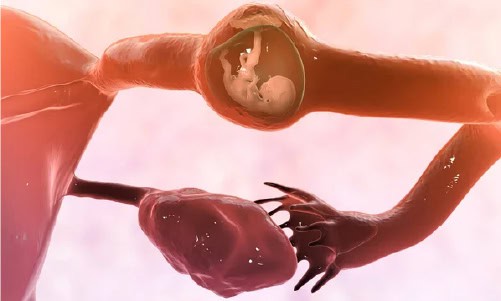Ectopic pregnancy occurs when a fertilised egg implants outside the uterus, typically in a fallopian tube. This condition poses serious risks such as rupture, internal bleeding, infertility, and in severe cases, maternal mortality.
If you're considering treatment for an ectopic pregnancy, reach out to us or book a direct appointment with our gynaecologist. At the CK Birla Hospital, we are dedicated to ensuring that your ectopic pregnancy treatment is as safe, comfortable, and effective as possible. We're here to guide you every step of the way toward a successful recovery.

Ectopic pregnancy commonly occurs when there are factors that impede or obstruct the normal passage of the egg through the fallopian tube. There are several causes for this:
An ectopic pregnancy poses serious risks if untreated. As the ectopic pregnancy progresses, it can lead to:
Prompt medical attention is crucial to avoid complications like infection and future fertility issues.
The several types of ectopic pregnancy include:
Heterotopic pregnancy, rare but serious, involves ectopic and intrauterine pregnancies.
Ectopic pregnancies pose significant risks to mothers and prevent embryos from developing to term, requiring swift intervention for immediate health and future fertility. Treatment strategies vary based on pregnancy location and progression and include:
Medication:
Doctors may prescribe methotrexate to halt ectopic mass growth, averting ruptures. Regular blood tests monitor effectiveness and symptom management. Symptoms of successful medication use mimic a miscarriage, which are:
Surgery is seldom needed post-medication, reducing fallopian tube damage risks and temporary infertility.
Surgery (laparotomy):
Surgeons remove the embryo and mend internal injuries using minimally invasive techniques. Additional surgeries may be necessary for persistent ectopic pregnancies or severe damage. Aftercare involves monitoring incisions for:
The advantages of laparoscopic/robotic axillary breast surgery over traditional axillary breast surgery are summarised below:
| Feature | Laparoscopic/Robotic Surgery | Open Surgery |
| Incision size | Small, keyhole incisions | Larger, single incision |
| Recovery time | Generally shorter | Longer |
| Postoperative pain | Typically less | Typically more |
| Hospital stay | Shorter (often same-day discharge) | Longer |
| Cosmetic result | Minimal scarring | More noticeable scar |
| Return to normal activities | Quicker | Slower |
However, the choice between laparoscopic/robotic and open surgery depends on individual patient factors and surgeon expertise. Each method has its own set of advantages and should be considered in the context of the patient’s overall health and specific circumstances
The cost of an ectopic pregnancy treatment varies as per the specific type of treatment advised by a healthcare provider, such as:
Medication
Surgery (laparotomy)
The cost can also vary widely depending on several factors, including the location, the extent of the treatment, the doctor’s experience, and the hospital’s pricing structure.
To get an explicit estimate for the cost of an ectopic pregnancy treatment at the CK Birla Hospital, contact the hospital directly. Additionally, you can consult with our board-certified gynaecologist to discuss your specific needs and receive a personalised quote for the treatment.
Not all situations can be predicted or prevented. However, you can lower your risk by maintaining good reproductive health. Encourage your partner to use a condom during intercourse and limit your sexual partners, which helps decrease the chance of contracting STDs that can lead to PID, a condition causing inflammation in the fallopian tubes.
Ensure you have routine appointments with your doctor, including regular gynaecological check-ups and STD screenings. Improving your overall health, like quitting smoking, is another effective way to prevent health issues.
Conceiving after an ectopic pregnancy is possible but may depend on individual circumstances. Consult with a healthcare provider for personalised guidance and considerations.
The risk of recurrence after one ectopic pregnancy is generally around 10-15%. Factors such as tubal damage or underlying conditions can influence individual recurrence rates. Consult a healthcare provider for a personalised assessment.
Yes, ectopic pregnancy symptoms like abdominal pain and vaginal bleeding can resemble symptoms of other conditions such as appendicitis or miscarriage. A timely medical assessment is essential for precise diagnosis.
If you suspect an ectopic pregnancy (especially with symptoms like abdominal pain or vaginal bleeding), seek immediate medical attention for evaluation and appropriate management to prevent complications.